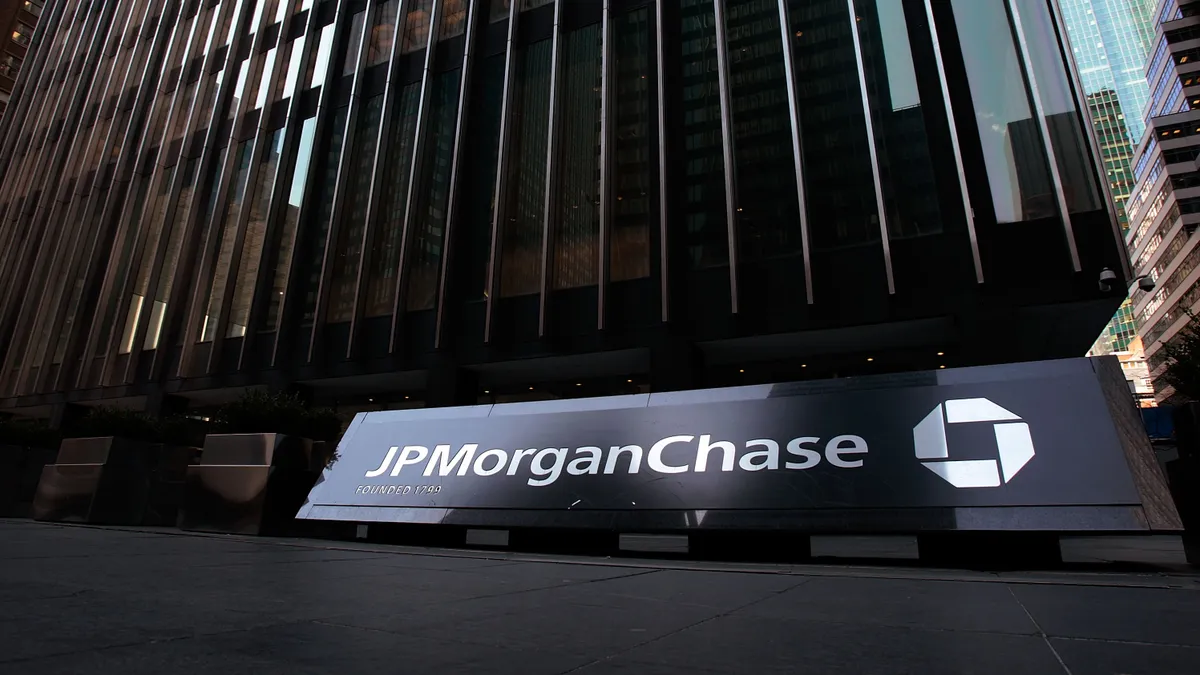Dive Brief:
- JPMorgan Chase will give customers an additional business day — starting next year — to restore overdrawn accounts to $50 in the red or less before a fee is charged, the bank said in a press release Wednesday.
- The bank, also in 2022, will give users access to direct-deposit paychecks two days early, it said Wednesday.
- These changes will have a "not insignificant" impact on the bank’s revenue, Jenn Piepszak, co-head of the bank's consumer and community banking unit, told Reuters. "We believe this set of changes puts us in a leadership position competitively."
Dive Insight:
Wednesday's move expands on a policy shift JPMorgan instituted in August, when it raised the overdraft threshold so that only accounts owing more than $50 would incur fees. (Before August, the limit was $5.) The bank in August also eliminated fees connected to bounced checks.
Under the change that rolls out next year, customers will have until the end of the business day after overdrawing to get their account to within $50 of positive. The policy, as it stands, gives customers until the end of the same day.
JPMorgan Chase expects its new policies to help more than 2 million customers save on overdraft fees.
Lawmakers and regulators this year have blasted the overdraft fee as easy money that causes customers unnecessary pain.
"For many big banks, overdraft fees are still the steady, reliable, predictable, easy revenue that shareholders love," Consumer Financial Protection Bureau (CFPB) Director Rohit Chopra said Dec. 1.
Sen. Elizabeth Warren, D-MA, at a May hearing, targeted JPMorgan specifically, calling its CEO, Jamie Dimon, "the star of the overdraft show" and claiming the bank collected close to $1.5 billion in overdraft fees in the previous year.
"I think your numbers are totally inaccurate," Dimon countered, adding the bank waived fees upon request for customers who were struggling amid the COVID-19 pandemic.
Wednesday's announcement comes on the heels of Capital One’s decision to eliminate overdraft fees for its consumer bank customers. In doing so, the McLean, Virginia-based bank became the country's largest to eliminate overdraft fees.
Chase decided to not eliminate overdraft fees entirely because that would force the bank to bounce more checks written by its clients, Piepszak told Reuters.
The CFPB reported this month that JPMorgan Chase, Wells Fargo and Bank of America brought in a combined 44% of total overdraft fees reported in 2019 by banks with over $1 billion in assets.
JPMorgan disputed that figure, telling Bloomberg "the CFPB’s numbers don’t reflect changes we made earlier this year to our overdraft services, which have already helped 1.7 million customers."
Many financial institutions have shown this year they are rethinking their overdraft policies.
Digital-only financial institutions Ally Bank and Alliant Credit Union eliminated the fee in June and August, respectively.
Citizens Bank in October introduced technology that alerts users to overdraft withdrawals — a feature akin to PNC's "low cash mode," an offering — announced in April — that gives the bank's customers a 24-hour buffer before overdraft fees are charged.
Columbus, Ohio-based Huntington Bank in June launched a digital-only loan product that would give eligible customers immediate access to a line of credit up to $1,000 with no interest or fees if they sign up for automatic payments.
Santander last month softened its policy to allow customers to overdraw their accounts up to $100 without penalty. San Antonio-based Frost Bank debuted a similar feature in April.
TD Bank unveiled a deposit account in June that does not allow customers to overdraw funds and does not have a minimum daily balance requirement.
Other overdraft alternative products launched this year have maintenance fees attached. Regions' Now Checking option charges a flat $5 monthly fee and links a user's Regions accounts to provide overdraft protection without transfer fees. Bank of America's Balance Connect ferries money from another of the user's Bank of America accounts to an overdrawn one for a $12-per-transaction fee.













